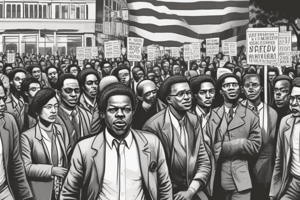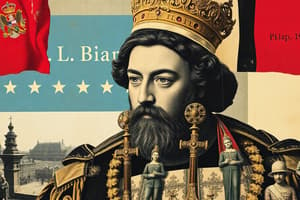Podcast
Questions and Answers
What did Executive Order 8802, passed by FDR, aim to prevent in defense industries and federal jobs?
What did Executive Order 8802, passed by FDR, aim to prevent in defense industries and federal jobs?
- Discrimination based on political affiliation and beliefs
- Discrimination based on social class and education
- Discrimination based on gender and age
- Discrimination based on race, color, creed, and national origin (correct)
Which campaign sought victory against fascism in Europe and racism at home?
Which campaign sought victory against fascism in Europe and racism at home?
- Victory Now Campaign
- Double V Campaign (correct)
- Single R Campaign
- Triple W Campaign
What did the Fair Employment Practices Commission (FEPC) regulate?
What did the Fair Employment Practices Commission (FEPC) regulate?
- Interstate transmission of electricity, natural gas, and oil (correct)
- Interstate banking transactions
- Interstate transportation of goods
- Interstate communication networks
Who challenged Executive Order 9066 that led to the court ruling it as a military necessity?
Who challenged Executive Order 9066 that led to the court ruling it as a military necessity?
What agreement allowed millions of Mexicans to work in the US in agriculture and labor during the War?
What agreement allowed millions of Mexicans to work in the US in agriculture and labor during the War?
Which event led to Mexicans being attacked by whites for wearing 'zoot suits'?
Which event led to Mexicans being attacked by whites for wearing 'zoot suits'?
Which event marked the division between Eastern and Western Europe, leading to the beginning of the Cold War era?
Which event marked the division between Eastern and Western Europe, leading to the beginning of the Cold War era?
What was the top-secret plan that developed the first atomic bombs dropped on Hiroshima and Nagasaki?
What was the top-secret plan that developed the first atomic bombs dropped on Hiroshima and Nagasaki?
Which major event led to the reorganization of Europe to defeat Nazi Germany?
Which major event led to the reorganization of Europe to defeat Nazi Germany?
What was the purpose of the United Nations replacing the League of Nations?
What was the purpose of the United Nations replacing the League of Nations?
Which conference involved three major allies: US-FDR, UK-Churchill, and Soviet Union-Stalin?
Which conference involved three major allies: US-FDR, UK-Churchill, and Soviet Union-Stalin?
What did the Containment policy of the US aim to control?
What did the Containment policy of the US aim to control?
What was the main aim of President Harry Truman's Fair Deal policies?
What was the main aim of President Harry Truman's Fair Deal policies?
During the Red Scare, what was the primary focus of suspicion and investigations?
During the Red Scare, what was the primary focus of suspicion and investigations?
What was the purpose of the Loyalty Security Program in the 1940s?
What was the purpose of the Loyalty Security Program in the 1940s?
What was the focus of the HUAC investigations during the Cold War era?
What was the focus of the HUAC investigations during the Cold War era?
Who were the Hollywood Ten and what happened to them?
Who were the Hollywood Ten and what happened to them?
What effect did the Fair Deal have on social welfare programs and civil rights initiatives?
What effect did the Fair Deal have on social welfare programs and civil rights initiatives?
What was the primary focus of McCarthyism in the early 1950s?
What was the primary focus of McCarthyism in the early 1950s?
What were the main consequences of McCarthyism?
What were the main consequences of McCarthyism?
What were Ethel and Julius Rosenberg accused of that led to their execution in 1953?
What were Ethel and Julius Rosenberg accused of that led to their execution in 1953?
Which U.S. President was known for his emphasis on national security during the Cold War?
Which U.S. President was known for his emphasis on national security during the Cold War?
What major international financial institutions were established during the Bretton Woods Conference?
What major international financial institutions were established during the Bretton Woods Conference?
What is the main purpose of the World Bank?
What is the main purpose of the World Bank?
What benefits did the GI Bill provide to veterans returning from World War II?
What benefits did the GI Bill provide to veterans returning from World War II?
Who is known for their innovative mass production techniques in building affordable suburban housing?
Who is known for their innovative mass production techniques in building affordable suburban housing?
Which government agency is responsible for providing healthcare, benefits, and services to veterans and their families?
Which government agency is responsible for providing healthcare, benefits, and services to veterans and their families?
What contributed to the growth and development of suburbs after World War II?
What contributed to the growth and development of suburbs after World War II?
Which court case symbolizes efforts for fair housing practices in the United States?
Which court case symbolizes efforts for fair housing practices in the United States?
What did the Federal Housing Administration (FHA) contribute to in terms of housing developments?
What did the Federal Housing Administration (FHA) contribute to in terms of housing developments?
Flashcards are hidden until you start studying
Study Notes
A. Philip Randolph and the Fair Employment Practices Commission
- A. Philip Randolph, a Black labor leader, called for a march on Washington, D.C. to protest discrimination in the defense industry and federal jobs.
- This led to the passage of Executive Order 8802 by FDR, which prohibited discrimination in defense industries and federal jobs based on race, color, creed, or national origin.
- The Fair Employment Practices Commission (FEPC) was established to regulate and enforce fair employment practices in industries and jobs related to national defense.
The Double V Campaign
- The Double V Campaign was launched by African Americans, with white supporters, to fight for victory against fascism in Europe and racism at home.
Gunnar Myrdal and "The American Dilemma"
- Gunnar Myrdal wrote "The American Dilemma," a book that highlighted the contradictions between American values and policies, particularly regarding racial discrimination.
Zoot Suit Riots and the Bracero Program
- The Zoot Suit Riots occurred when white Americans attacked Mexican Americans who wore "zoot suits," a symbol of cultural identity.
- The Bracero Program was an agreement between the US and Mexico that allowed millions of Mexican laborers to work in the US, primarily in agriculture, during World War II.
Executive Order 9066 and Japanese Internment
- Executive Order 9066, signed by FDR, allowed for the forced relocation of Japanese Americans from the West Coast to internment camps during World War II.
- The Supreme Court upheld the internment, citing military necessity over individual rights.
Korematsu v. U.S.
- Fred Korematsu, a Japanese American, challenged Executive Order 9066, arguing it violated his constitutional rights.
- The Supreme Court ruled against Korematsu, siding with the government's claim of military necessity.
World War II and the Holocaust
- D-Day marked the Allied invasion of Nazi-occupied France in 1944.
- The Holocaust, also known as the Final Solution, was the Nazi plan to exterminate European Jews.
- The Manhattan Project was a top-secret US project that developed the first atomic bombs, dropped on Hiroshima and Nagasaki.
Post-War International Relations
- The Yalta and Potsdam Conferences were held between the US, UK, and Soviet Union to discuss post-war reorganization and the division of Germany into four zones.
- The United Nations was established to replace the League of Nations, with five permanent members: the US, UK, France, China, and the Soviet Union.
- The Iron Curtain speech by Winston Churchill marked the beginning of the Cold War era.
Containment Policy and the Cold War
- The US adopted a containment policy towards the Soviet Union, aiming to prevent the spread of communism.
- The Fair Deal, proposed by President Harry Truman, aimed to address social and economic issues in the US, leading to the expansion of social welfare programs, civil rights initiatives, and economic reforms.
- The Red Scare, Loyalty Security Program, and HUAC investigations marked a period of anti-communist hysteria and fear in the US.
The Hollywood Ten and McCarthyism
- The Hollywood Ten consisted of film industry professionals who refused to cooperate with HUAC's investigations into communist influences in Hollywood.
- McCarthyism, led by Senator Joseph McCarthy, was characterized by accusations, investigations, and unfounded allegations of communist sympathies.
Eisenhower and the Bretton Woods System
- Dwight D. Eisenhower was the 34th President of the US, focusing on national security and economic stability.
- The Bretton Woods System established international economic agreements, including the creation of the International Monetary Fund (IMF) and World Bank.
Post-War Suburbanization and the GI Bill
- The GI Bill provided education, housing, and loan benefits to veterans, contributing to post-war economic growth and social mobility.
- Suburbanization was driven by factors like economic prosperity, automobile ownership, government policies, and social preferences for suburban lifestyles.
- William Levitt developed innovative mass production techniques for suburban housing, particularly in Levittown, New York.
Studying That Suits You
Use AI to generate personalized quizzes and flashcards to suit your learning preferences.




